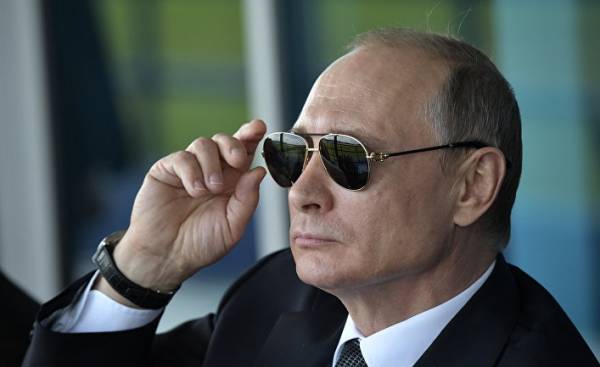
Here’s a question for advocates of the cold war: was there ever a time — even with the Cuban missile crisis when Russia was on the front pages of Newspapers during the same long period, as it is now, since the election of Donald trump?
This week Congress finally approved the bill on sanctions against Russia, which significantly restricts the right of President Donald trump to ease the pressure on the Kremlin. The President of Russia Vladimir Putin reacted to the expulsion of many American diplomats and the seizure of the American warehouse and rustic home located near Moscow. It’s pretty petty step, comparable in its pettiness with the decision of the Obama administration to seize the Russian departmenst in Maryland and new York.
A small digression: since this story involved Donald trump is a tycoon in real estate and an unsurpassed master to make deals — I would like to find out who won in this exchange of property. Unfortunately, although we know that Russian property in Maryland is a pretty nice place, only the American garden, which I was able to find, is unlikely to be of great interest to the audience.
Back to the main topic. Trump, who has threatened to veto the previous version of the bill now faces a choice. It can change its decision and lose face, or to veto the bill, against which voted five to five! — members of Congress.
It looks humble, a little storm in a teacup. However, it all seems absolutely insignificant in comparison with the situation in Ukraine, where Russia annexed the Crimean Peninsula, in Syria, which has killed half a million people, compared with the intervention in the presidential election in 2016, which — depending on which party you belong to — cost or cost Hillary Clinton the victory.
How important are these sanctions in a broader context? To learn expert opinion, I turned to the man, who has long been at the heart of this confusing situation — Evelyn Farkas (Farkas Evelyn). As Deputy assistant Secretary of defense for Russia, Ukraine and Eurasia from 2012 to 2015, Farkas was one of the key members of the Obama administration’s opposition to Russian aggression. She currently holds the position of visiting fellow at the Atlantic Council and author of materials for MSNBC. The following is an edited version of our conversation.
Tobin, Harsha: Many people believe that sanctions will not be effective. Others argue that, for example, that sanctions forced Iran to sit at the negotiating table on its nuclear program. In General, whose point of view do you share?
Evelyn Farkas: I think that the key point in the issue of sanctions is how they are implemented. Even the example of the narrow and targeted sanctions, which now are, we realized that we needed to tighten and adjust. We have seen how the sanctions have changed names, changed as the formal owners of companies, therefore, those who are responsible for implementing the sanctions should inform developers about the need to make the appropriate changes.
In this sense, when the Secretary of state Rex Tillerson said during hearings on his confirmation that he is critical of the sanctions, he added that his opinion may change if the implementation of sanctions will be more effective. That’s a good point. We don’t have enough resources to effectively implement even those sanctions that are already in place. Therefore, imposing additional sanctions, we should increase the capacity of the Ministry of Finance and Ministry of justice to enable them to implement them fully.
The reason why sanctions against Iran have worked, is that we were able to implement them through political pressure — for example, we heard from India on the phone and urged her not to buy Iranian oil.
In the case of Russia, in layman it may seem that the sanctions have not brought almost any results. On the other hand, why the Russians so strongly against a new package of sanctions against the Magnitsky Act, if they do not they hurt? Whether associates of Putin feeling the pressure?
Yes. Sanctions are designed to help to achieve certain goals in the shortest possible time. That is why under Obama we’ve designed them so that they focus primarily on members of Putin’s inner circle and related companies.
— It seems that in this new bill on sanctions the White house is most worried about is that this document significantly restricts the ability of trump to lift the sanctions or to ignore Russia’s actions. Do you think that Congress crosses the border, venturing too far into the territory of the Executive branch?
— Under normal circumstances, as a man who spent half his career in the legislative branch, and the other half in the Executive and that is why we learned the powers of each of them, I would have hardly supported that, in fact, is the right of Congress to veto the President’s decisions. But the current situation cannot be considered normal. Congress, of course, loud signals that he does not trust the President in matters relating to Russia.
Someone can point to the results of the poll, according to which voters of the Republican party more sympathetic to Putin and Russia. But I don’t think we should pay attention to this indicator. The results of the surveys are too ephemeral. Because Congress, in fact, is a continuation of the people and the mouthpiece of his will, I believe that now the American people are also drawn to President Trump through Congress. People also don’t trust Trump in matters related to Russia.
— Are you concerned about that trump, as some experts warn, can begin to play for time, postponing the signing and implementation of anti-Russian sanctions?
— It is likely that the White house will give the agencies the order to monitor the implementation of sanctions through his fingers. But I can tell you that representatives of the state civil services share the view of Congress and the American people that the only way to stop Putin’s aggression against his neighbors and against the Western democracies is to speak out against him.
— Most experts believe that the annexation of Crimea is irreversible. You agree with that?
— No. I think that in the short and possibly medium term, the current status quo will be preserved, and the status of Crimea on the international scene will remain uncertain. But in the end have to negotiate, but Russia and Ukraine have to sign an agreement. The US continues to exert pressure. Under Obama we are constantly tightened sanctions in connection with Russia’s actions in Ukraine. Trump has met with President of Ukraine Petro Poroshenko at the White house before his meeting with Putin. At the moment, the administration has published a list of names and companies, who also had to contribute to the sanctions list.
— What we can do — in addition to what’s already being done — to help the Ukrainians regain control over Eastern Ukraine, which is controlled by militias?
— We need to strengthen the implementation of our program on preparation of the Ukrainian military and to give Ukraine lethal defensive weapons, as well as to provide it with economic assistance. We have to be active when it comes to Ukraine, because if we lose there, Putin can try his luck somewhere else, and that could spell an existential threat to our NATO allies.
The fact that Tillerson has appointed Kurt Volker (Kurt Volcker) that supports Ukrainian sovereignty, the new US special envoy to Ukraine, is a point in favor of the administration. But the US and its allies must quickly improve the deterrent potential of Ukraine, because, according to rumors, the Russian-backed militias and so-called green men can once again go on the offensive. This reflects the fact that the military balance leaned more in favor of Russia due to the military systems and forces that Moscow has deployed to the Crimea. We must ensure that Russia does not want to take the overland route leading to the East of Ukraine.
Next year Putin, most likely, re-elect for another term, and his strategy requires him to show voters that he again made Russia great. The Russian military is stuck in Syria, but we should expect some action. Putin knows how to keep us in the dark and knock us off balance.
— Many believe that we could cooperate with Russia in Syria in combating terrorist groups and political settlement of the conflict — we just need to ignore what Russia has done in Ukraine. Is this a reasonable price?
— In any case. Under Obama we have never considered the need to link these two questions, and fortunately, the new administration of the same opinion. I don’t see any signs that trump ties them together. He rightly called Syria a place where we can make a deal with Russia, and we must enter into this agreement. But we need leverage. And our President is weakened, the pressure ceasing to provide aid to the Syrian rebels. In Ukraine, this administration needs to do more than just encourage the Minsk process, she needs to find a way to provide the Ukrainians more tools of pressure.
— The invasion of Russia in Ukraine was a so-called hybrid warfare — the combination of propaganda, incite riots, providing arms to the militias, the redeployment of Russian troops in uniform without insignia and so on. Do you think that Putin will try to apply the same tactics in the Baltic countries or other countries member of NATO? If it happens, how we react and whether we realize the requirement of Article 5 in that case, if a full-scale invasion will not come?
I don’t believe that Putin wants to start a war with NATO or the United States. But if we do not act against him in Ukraine, he may try to verify the degree of our resolve in NATO countries, subject to the provisions of Article 5. Most likely, he will not go to a traditional invasion, and would not even use a little green men. He tries to use local power if they can make us look weak and to provoke even more dissent within NATO. In the end, he needs a weak West and the abolition of such institutions as NATO and the European Union, the West could no longer confront Russia in its “near abroad”.
Exactly the same goals it pursues in Syria and around the world. Russia considers itself a world power, and she is interested in selling weapons and oil around the world. Only the US and their allies can keep it in check.
— The US and NATO have strengthened their position in Eastern Europe by redeploying four more combat brigades. But can it scare Putin? After all, they are merely a speed bump on the way his army? Isn’t it serves him only a pretext for the further militarization of the border?
— I believe that these combat brigades needed, but I would feel better if they were there permanently. Now we are trying to observe the border between providing deterrence and non-infringement of the Founding act, the NATO-Russia 1997. The agreement commits its parties to respect the sovereignty of States and inviolability of borders. Under this agreement, NATO cannot deploy many regular troops on the territory of its new members.
But Russia has already violated the agreement by its actions in Ukraine. We should not needlessly tie their hands.
— Let’s return to intervention in the American elections, which you considered in connection with Putin’s actions in Eastern Europe. Its General plan is to just provoke confusion in the West, or he pursues some specific purpose?
— His plan is to wreak havoc, but the reason he wants to do it, is the desire to return to Russia the sphere of influence that it had under the tsarist regime in the 19th century and under the Soviet regime. And if he can achieve this in the former Eastern bloc, he moves on. He wants the West was weak and divided, so it can infringe on the sovereignty of States in these regions to achieve their goal.







